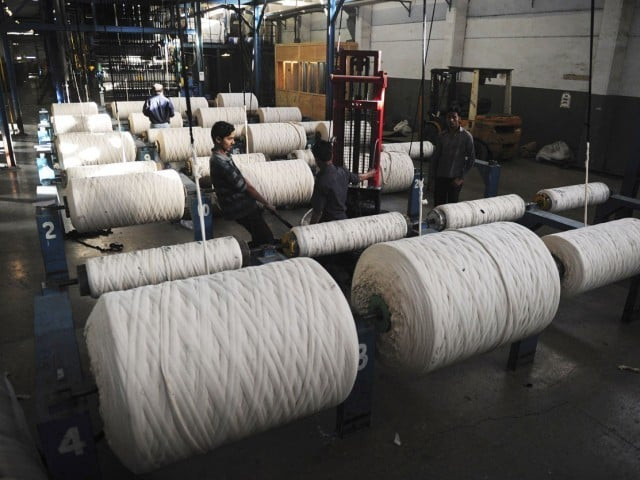Zero-rated: Export-oriented sectors jump up in joy
Dar says five sectors to see return of old tax regime

Dar says five sectors to see return of old tax regime. PHOTO: AFP
The news was welcomed by textile mills and other sectors who had been lobbying for the measure for years.
Pace of fall in exports 3 times faster than imports
“The resumption of the zero-rated regime will immensely help the textile industry,” Mian Kashif Ashfaq, CEO of ChenOne, a subsidiary of Chenab Group, told The Express Tribune.
Up until a few years ago, these sectors were protected from numerous taxes by a zero-rated tax regime. However, the regime was called into question in a plea that argued that exporters had been selling their (tax protected) goods in the domestic market as well.
The somewhat convoluted solution was to start taxing these sectors, and to offer refunds upon verification of export receipts. However, then another problem presented itself. These refunds would be blocked by the Federal Board of Revenue (FBR), at times for more than a year. This led to a chronic liquidity crunch that severely hampered the working capital requirements of these sectors.
Keeping in mind the decline in exports, it was predicted that the zero-rated regime would be resumed. Their confidence was further bolstered when Prime Minister Nawaz Sharif, on February 13, committed to resuming the old regime come fiscal year 2017. But there was uncertainty up until a few days before the budget announcement because the FBR was opposing the proposal.
Five export-oriented sectors get major tax relief
“But I do not think the zero-rated regime will immediately help the textile industry. It may require time because refunds of billions of rupees are still stuck with the FBR. There is huge electricity shortage and other problems in Pakistan too that are creating problems for exports,” said Ashfaq. While the situation of gas shortage has improved with the arrival of imported Liquefied Natural Gas (LNG), the government needs to revive textile industries that have been closed down in recent months, he added.
On the other hand, Fawad Anwar, managing director at Al Karam Textile Mills - one of the leading textile exporters from Karachi - said that he expects 10-12% increase in his company’s exports in the next 12 months.
“The impact of zero-rated regime will be seen on the country’s exports immediately because the FBR will now release refunds,” he added.
Exporters say the regime will ease their problems that were compounded by the extreme liquidity shortages.
Pakistan, Turkey ink MoU for promoting trade and exports
With over $13 billion exports, the textile sector dominates the five export-oriented sectors. The other four contribute close to $5 billion in export receipts.
Meanwhile, Pakistan Tanners Association (PTA) Chairman Gulzar Feroz said the regime will take a few years to create a visible impact in exports of the leather sector.
Published in The Express Tribune, June 4th, 2016.
Like Business on Facebook, follow @TribuneBiz on Twitter to stay informed and join in the conversation.


















COMMENTS
Comments are moderated and generally will be posted if they are on-topic and not abusive.
For more information, please see our Comments FAQ